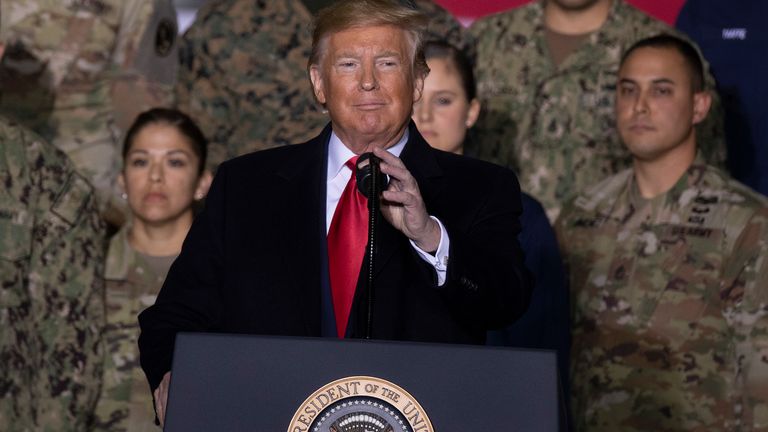
FILE PHOTO: U.S. President Donald Trump and China's President Xi Jinping shake hands ahead of their bilateral meeting during the G20 leaders summit in Osaka, Japan, June 29, 2019. REUTERS/Kevin Lamarque
The Trump administration is considering implementing tariffs on many essential materials, raising concerns in the U.S. defence sector. Experts say these tariffs, meant to boost local production and lessen reliance on foreign sources, might end up causing higher costs and delays in military projects. This article looks at how these tariffs could affect military contracts in areas like shipbuilding, aerospace, and other key defense industries.

Trump Tariff Plans: Goals and Possible Effects
The current administration intends to impose tariffs on key materials like steel, iron, aluminium, copper, and rare earth elements. These materials are crucial for making military equipment, including aircraft carriers and submarines. The goal of these tariffs is to cut down dependence on foreign suppliers, especially China, and boost local production in industries important for national security.
Experts warn these tariffs could disrupt supply chains for military equipment. They may also cause higher costs and project delays. Analysts note the plan aims to strengthen national security through U.S. manufacturing. But tariffs could instead raise prices and slow production schedules. Sectors relying on steel and rare earths appear most vulnerable.
Key Sectors Affected: Shipbuilding and Aerospace
Shipbuilding and Steel Dependence
The U.S. Navy and military contractors rely significantly on steel for shipbuilding. Aircraft carriers, which are enormous and complicated, require a lot of steel. The U.S. steel industry is already having trouble meeting demand, so adding tariffs could raise costs further. As steel prices go up, the total expense of military shipbuilding projects will likely rise too.
Shipbuilders like Huntington Ingalls and General Dynamics, already dealing with tight schedules and cost issues, may find things get worse with these tariffs. Bryan Clark, a senior fellow at the Hudson Institute, indicates that the disruptions could resemble the supply chain problems experienced during the COVID-19 pandemic. Consequently, defense contractors may need more funding from Congress or have to change their plans to deal with rising costs.
Aerospace and Aircraft Manufacturing
Aerospace companies, like Boeing and Lockheed Martin, may also struggle with tariffs on key materials such as aluminium and copper. Aluminium is valued for its strength-to-weight ratio and is crucial for building aircraft. Copper is increasingly used in aircraft wiring as planes get more electronic features.
The aerospace sector, known for having a trade surplus, is particularly vulnerable to tariffs that could disrupt global supply chains. An anonymous industry insider notes that broad tariffs on metals used in aerospace manufacturing could negatively impact this already thriving export sector. Although the U.S. aerospace industry has strong trade benefits, tariffs could lessen its competitiveness, especially with increasing production costs.
Economic Effects: Rising Costs and Supply Chain Problems
Tariffs could increase costs for the U.S. defence industry. Companies often pass these costs to government buyers. This shift may increase the overall cost of defence programmes. Experts warn shipbuilding will suffer most, given its already high costs. Domestic supply chains could also struggle with rising demand for key materials. Steel, rare earths, and other metals are vital but limited in supply.
Defence firms will compete with private companies for this scarce resource. As competition grows, material prices may rise across many sectors. The U.S. military finds it more difficult to procure steel if prices increase. These challenges may delay projects and increase the costs associated with critical defence work.
The Defense Production Act: A Possible Fix
The Trump administration might use the Defence Production Act (DPA) to deal with these challenges. The DPA would allow the government to prioritise buying critical materials for national security. The measure could mitigate the impact of rising prices and prevent material shortages from impeding military contracts.
By using Title III of the DPA, the government could also pump money into boosting domestic production of essential goods like rare earths and steel. This strategy might help the U.S. lessen its dependence on foreign suppliers and possibly reduce some price hikes caused by tariffs.

Winners and Losers: Who Gained and Who Lost?
Although tariffs may negatively impact certain sectors, they could also present some benefits. One major benefit is the push for U.S. companies to invest in boosting local production of key materials. For instance, if tariffs spur the creation of a domestic rare earth processing sector, it could lessen U.S. reliance on China, which currently holds a strong position in this area.
However, in the short run, tariffs’ costs could be greater than the advantages, especially for sectors like shipbuilding, aerospace, and military vehicle production. Companies like Boeing, which depend on stable material prices, might struggle with cost overruns on fixed-price deals, possibly hurting their profits and future market position.
Conclusion: A Fragile Balance for National Security
The tariffs proposed by the Trump administration could cause problems despite aiming to strengthen national security. The U.S. military relies heavily on steel, aluminium, and rare earth for essential equipment. Tariffs on these materials may bring higher costs, production delays, and supply chain problems.
As the administration moves forward, balance will be crucial. Reducing foreign dependence must not undermine the military’s urgent procurement needs. Protecting national security requires policies that avoid weakening defence programmes’ effectiveness.
References
- Hudson Institute, “Potential Disruptions in Military Supply Chains”, 2025
- The Washington Post, “Trump’s Tariff Plan and Its Impact on National Security”, 2025
- Defence News, “Experts Warn on Trump Tariffs Affecting Military Programs”, 2025
- Bloomberg News, “Trump Discusses Economic Leverage via Tariffs,” October 2024









